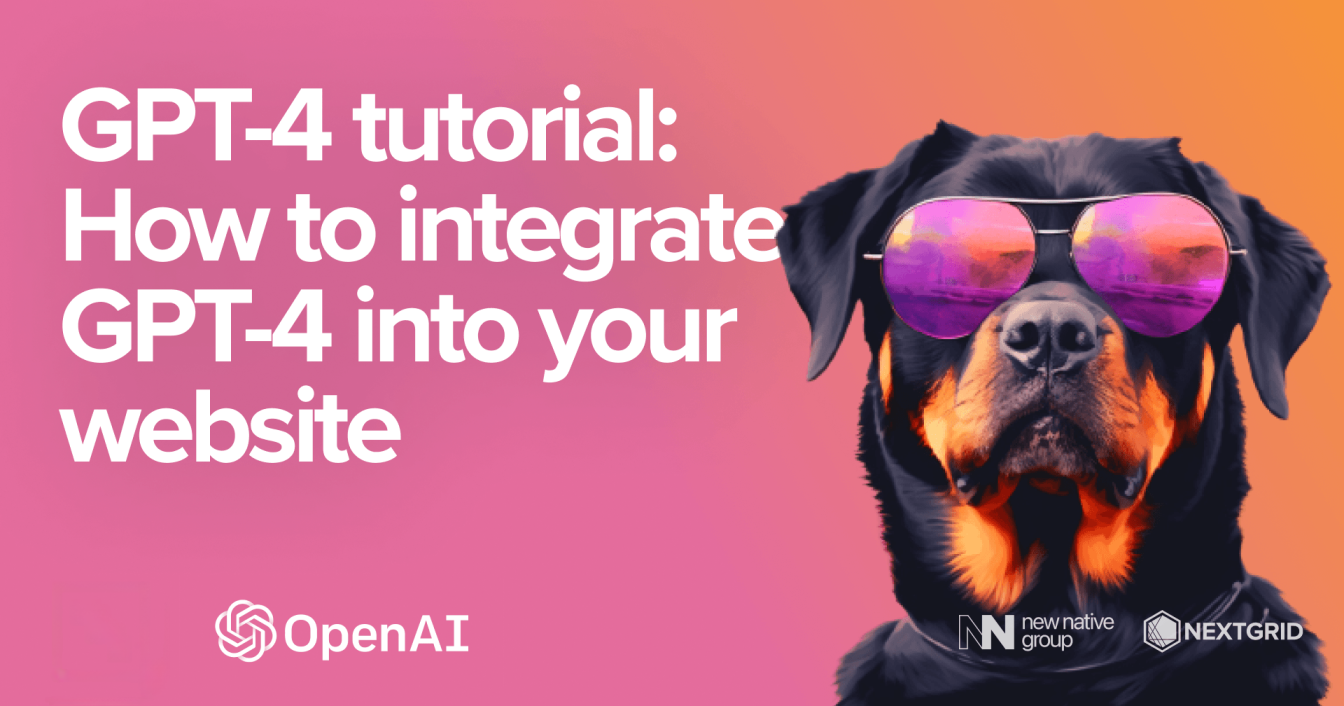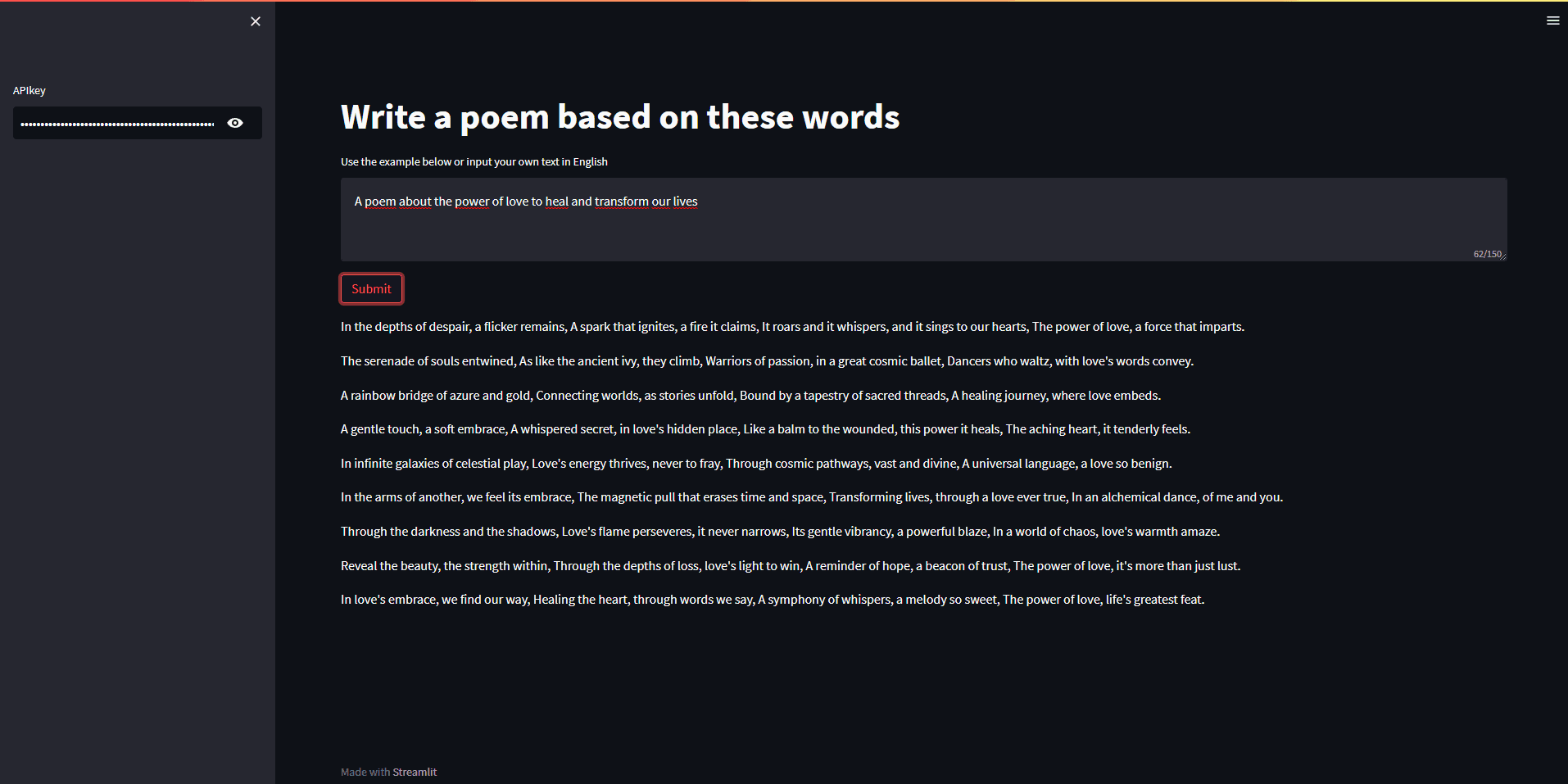GPT-4 教程:如何将 GPT-4 集成到您的网站中


GPT-4 来了!
GPT-4 是 OpenAI 的一种新的大型多模态模型。它是第四代 GPT 语言模型。GPT-4 在很多任务上都优于 GPT-3。由于其广泛的常识,最好使用它而不是以前的模型。在本教程中,我们将向您展示如何将 GPT-4 集成到 streamlit 项目中。
如何访问 GPT-4?
GPT-4 API 并非对所有人可用,它仍处于limited beta. 您可以在 OpenAI 的网站上申请访问。为此,您需要用您的数据填写表格并回答一些问题。如果您被接受,您将收到一封电子邮件,其中包含 GPT-4 测试版的邀请。
如何将 GPT-3 转换为 GPT-4?
将 GPT-3 更改为 GPT-4 有点棘手。类似 GPT-4 的gpt-3.5-turbo模型,针对聊天完成而非文本完成进行了优化。由于其广泛的一般知识,它也适用于传统的文本补全。因此,我们应该将completion函数更改为chat completion。在本教程中,我们将使用 Python SDK 和 lablab.ai 的GPT-3 Streamlit Boilerplate。

克隆我们的存储库
首先,我们需要克隆我们的存储库。您可以通过运行以下命令来完成:
git clone https://github.com/nextgrid/streamlit_gpt3_boilerplate让我们进入项目目录:
cd streamlit_gpt3_boilerplate安装依赖
现在我们需要安装所有依赖项。你可以通过运行来做到这一点:
pip install -r requirements.txtGPT-3 -> GPT-4
为此,我们需要打开model.py. 我们应该照顾GeneralModel班级。为了能够使用 GPT-4,我们需要更改openai.Completion.create为openai.ChatCompletion.create. 我们还需要调整kwargs参数以满足 GPT-4 的需求。同样在create函数本身中,我们必须添加model参数,将prompt关键字更改为messages,并以不同的方式从最终响应中提取内容。
随意更改传递给模型的参数(例如温度)并查看它如何影响输出。
前
class GeneralModel: def __init__(self): print("Model Initialization--->") def query(self, prompt, myKwargs={}): """ wrapper for the API to save the prompt and the result """ # arguments to send the API kwargs = { "engine": "text-davinci-002", "temperature": 0.85, "max_tokens": 600, "best_of": 1, "top_p": 1, "frequency_penalty": 0, "presence_penalty": 0, "stop": ["###"], } for kwarg in myKwargs: kwargs[kwarg] = myKwargs[kwarg] r = openai.Completion.create(prompt=prompt, **kwargs)["choices"][0][ "text" ].strip() return r def model_prediction(self, inp, api_key): """ wrapper for the API to save the prompt and the result """ # Setting the OpenAI API key got from the OpenAI dashboard set_openai_key(api_key) output = self.query(poem.format(input=inp)) return output后
class GeneralModel: def __init__(self): print("Model Initialization--->") def query(self, prompt, myKwargs={}): """ wrapper for the API to save the prompt and the result """ # arguments to send the API kwargs = { "temperature": 0.9, "max_tokens": 600, } for kwarg in myKwargs: kwargs[kwarg] = myKwargs[kwarg] r = openai.ChatCompletion.create( model="gpt-4", messages=[{"role": "system", "content": prompt}], **kwargs ) return r["choices"][0]["message"]["content"].strip() def model_prediction(self, inp, api_key): """ wrapper for the API to save the prompt and the result """ # Setting the OpenAI API key got from the OpenAI dashboard set_openai_key(api_key) output = self.query(poem.format(inp=inp)) return output运行项目
现在我们可以运行这个项目了。你可以通过运行来做到这一点:
streamlit run gpt_app.py让我们尝试生成一首诗!

那么 GPT-4 API 值得实施吗?

好,当然!将 GPT-3 更改为 GPT-4 并不难,只需要进行一些更改,您可以在本教程或 OpenAI 的教程和文档中找到它们。值得一试,因为 GPT-4 是一个很棒的模型,至少值得一试!正如您可能已经读到的那样,它具有更强大的功能、更少的幻觉、新的惊人功能(如图像输入)等等!
这取决于你,你将在它之上构建什么,但你只是得到了一个新的强大工具可以使用。由于您目前正在使用 Whisper 和 ChatGPT API 进行构建,您可能会考虑使用 GPT-4 API 升级您的项目。
如果您想使用 AI 进行构建,我们鼓励您加入 aihubpro.cn 社区
或者
加入我们即将举行的 Whisper 和 ChatGPT AI 黑客松,或任何其他使用尖端 AI 技术的活动。
构建工作原型并使用我们的弹弓程序加速它。
用 AI 塑造世界用 AIHubPro.cn改变你的生活
感谢您的时间!– AI未来百科 ; 探索AI的边界与未来! 懂您的AI未来站
